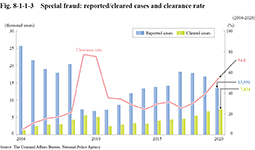2 Special fraud
Fig. 8-1-1-3 shows the number of reported cases, cleared cases, and clearance rate for “special fraud”. Special fraud is a generic term that refers to certain types of fraud, extortion or theft offenses in which offenders use telephones or other devices to avoid confronting victims in person and subsequently defrauds victims into making money transfers and the like to profit offenders.
One type of special fraud, the “It’s me” fraud (an offender makes a call to a victim, pretending to be their child or someone close to them in need of urgent monetary assistance,) began to escalate around the summer of 2003, and the reported cases for special fraud reached approximately 25,700 and the amount of damage climbed to approximately 28.4 billion yen in 2004. Society has been facing the serious challenge with greater sophistication and diversity of special fraud.
Special fraud is committed systematically by a criminal group consisting of masterminds or leaders who play a central role, callers who make phone calls to defraud a victim, receivers who go to a place such as the victim’s house to collect cash, etc., drawers who withdraw money from an ATM, from an account into which the victim payed, and logistics who find and prepare a secret hideout, cellphones and bank accounts under a fictitious or third party name.
Fig. 8-1-1-3 Special fraud: reported/cleared cases and clearance rate
